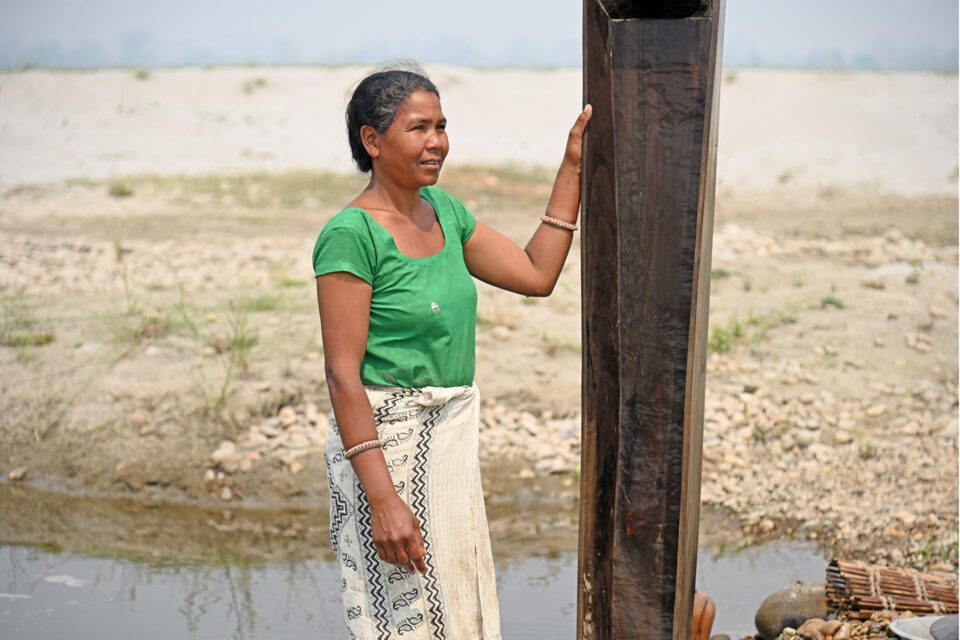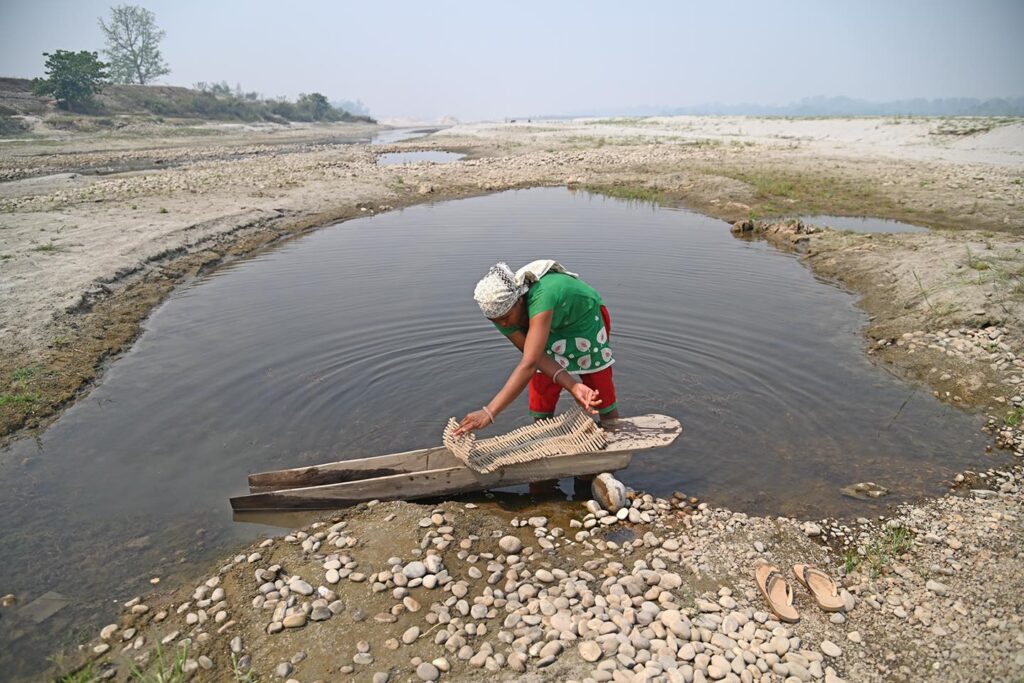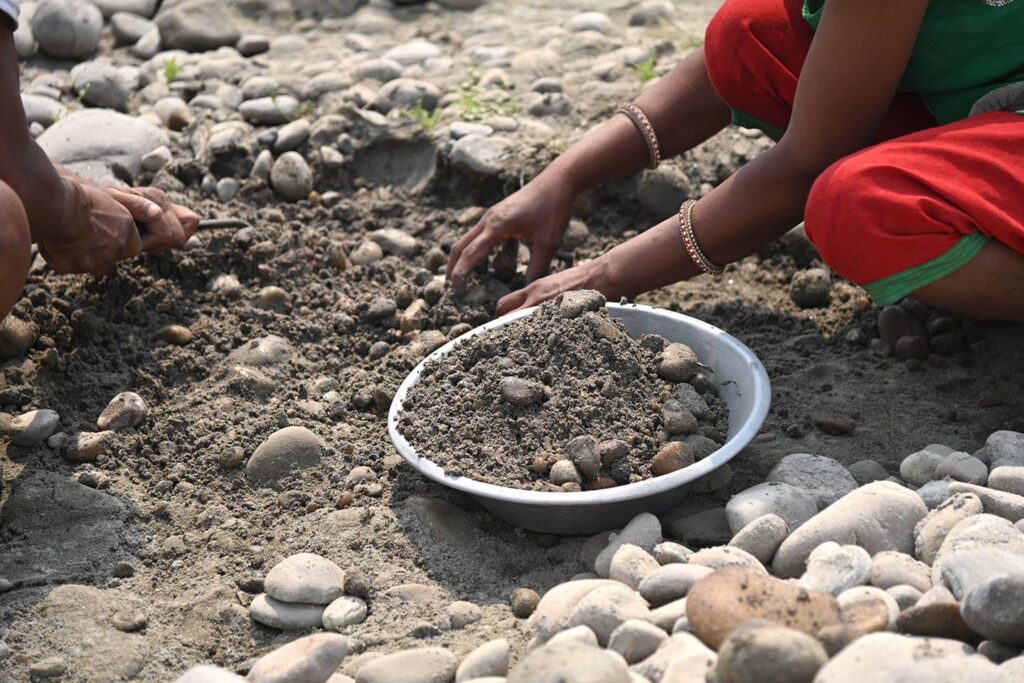
Tara Sonaha, Murghauwa Rajapur Municipality, Bardia
“We have always lived by the riverside, near water and sand. We panned gold in the sand and caught fish. We lived in huts that could be easily swept away when the river changed its course during the monsoon.We couldn’t move from the banks easily. Sonahas got married here on the banks of the river and they had babies here. The river was their home. I learned how to catch fish when I was little although girls were not expected to fish. The men would fish and the women would pan for gold. I like doing both and in no time I became perfect.
It was our way of life. Monsoon was the season for us. A lot of sand would pile up and it was like a mine of gold. All the women would be busy. Many of them would make a little dent in the sand and put their infants there. They would leave them there while they filtered that sand. Those were amazing sights for an outsider. Many would be really surprised when they learned of us. When they learnt of panning gold from the river.We were this community very little in number and we were given the privilege to pan gold. Panning gold is a work of science but we also do it. No degrees, no alphabets but we bring out gold from the sands.We have moved a little inland now. There are several reasons. As the number of people grew forests were cut to make the land for them. This caused landslides and unexpected flooding. Theriver that was our friend started to trouble us. We would be able to predict its movement but the river had started to move its courses without warning. So, we had to move inland to save our children.But, even today we rely on the river as our ancestors had. We still go catch fish. We still go pan gold. That is our livelihood. The Sonahas never preferred to work in the fields. First of all, we had no land of our own and the Bataiya system was not appealing. You do all the hard work and give half of the produce to someone? It never made sense to us. So we all preferred to pan gold and fish. You pan gold all day, collect it and sell it for cash. You fish all day, collect it and sold it for cash. That was a smarter thing to do, I think.
Unfortunately, our livelihoods are at risk. Everyone is catching fish now when once it was only us. Even people from the hills are coming to these rivers and taking away the fish. Mobs come here and use electro fishing, explosives and poison and kill all the fish and their eggs. There is so much of gravel mining that the shelters of the fishes have been destroyed. They have taken away all the sand and with it all the gold. We end up panning all day and return home empty hands. I heard the government is buying a machine that can filter tons of sand and extract the amount of gold we would extract in a year in one day.
Who is going to talk about this? Who is going to represent us? There is a lot of unspoken fear in our hearts but now I see some changes in the community. We have our own group and committees formed with the support from Paani Program that work for the Sonaha community. The program has helped us diversifying our occupation. Now we also harvest fish on the pond and farm vegetables and not only depend on fish from the river. Many men have left for a foreign country to find work. My husband himself is a driver and only goes fishing when he has time. Sometimes, things get difficult but we hope everyone will realize our problems. We hope our stories will reach the people who can come save our rivers and fishes for the people who are destroying it are more in numbers and have more power than us.”
(Tara Sonaha, Murghauwa, Rajapur Municipality, Bardia)
Tara Sohana is a member of Sohana Community living in the bank of Karnali River fishing and panning gold for livelihood from a long time. With the support of USAID Nepal’s Paani Program, the river resources dependent Sohana communities received alternative livelihood opportunities through Integrated Fish Farming and Climate Smart Vegetable Farming schemes developed by the program. The communities are also continuously advocating for sustainable riverbed mining as they are the most vulnerable due to flooding.






“हामीहरू पहिल्यैदेखि बालुवा र पानीसँगै नदीतटमा बस्दै आएका हौँ । हामीले बालुवा छानेर सुन निकाल्थ्यौँ अनि माछा पनि मार्थ्यौँ । वर्षामा नदीले धार परिवर्तन गर्दा सजिलै बगाउने खालको झुप्रोमा बस्थ्यौँ । तर नदी किनारबाट अन्त जान हामीलाई सजिलो थिएन । सोनाहाहरूले यहिँ विहे गरे, यहिँ बच्चा जन्माए । नदी नै उनीहरूको घर भयो । छोरी मान्छेले माछा समात्नु हुन्न भन्थे । तर मैले त सानैदेखि माछा समात्न सिकेँ । छोरामान्छेले माछा समात्ने अनि छोरीमान्छेले चैँ बालुवा चालेर सुन खोज्ने काम गर्थे । मलाई दुवै काम मनपर्ने भएकोले दुवै काममा छिटै पोख्त भएँ । हाम्रो जीवन जिउँने तरिका यस्तै थियो । वर्षा नै हाम्रो लागि उपयुक्त मौसम थियो । वर्षायामले बलुवाको थुप्रो ल्याउँथ्यो, जुन हाम्रो लागि सुनखानी जस्तै थियो । सबै महिलाहरू व्यस्त हुन्थे । धेरैले आफ्ना साना नानीहरूलाई बालुवामा सानो खोपिल्टो खनेर राख्थे । अनि आफ्नो बच्चालाई त्यहिँ छाडेर बालुवा चाल्न जान्थे । बाहिरबाट आएकाहरूलाई त त्यो अनौठो दृश्य लाग्थ्यो । हाम्रो त्यस्तो चालचलन देखेर कति त आश्चर्यमै पर्थे । हाम्रो समुदाय सानो संख्यामा भएकाले बालुवामा सुन खोज्न हामीलाई छुट दिइएको थियो । बालुवाबाट सुन निकाल्नु पनि एउटा विज्ञान हो, जुन हामी पनि गर्छौँ । न त पढेलेखेको छ, न त अक्षर नै चिनेको छ, तर पनि हामी बालुवाबाट सुन निकाल्छौँ । अहिले त हामीहरू पनि नदी किनारबाट जमिनतिर अलि सरेकाछौँ । त्यसका धेरै कारणहरू छन् । जनसंख्या बढ्दै गएपछि मानिसहरूकालागि ठाउँ बनाउन जंगल मासिँदै गयो । यसले गर्दा अप्रत्यासितरूपमा बाढीपहिरो जान थाल्यो । अनि त हाम्रो साथी जस्तै नदीले दुःख दिन थाल्यो । नदीको वहाव बारे आँकलन गर्न हामीहरू सक्षम थियौँ, तर बिना कुनै संकेत नदीले बाटो बिराउन थाल्यो। अनि त हाम्रा नानीहरूलाई बचाउन हामी पनि किनारबाट जमिनतिर सर्न बाध्य भयौँ ।तर आज पनि हामी हाम्रा पुर्खाहरूझैँ नदीमा नै निर्भर छौँ । अझै पनि माछा मार्न जान्छौँ । अझै पनि सुन खोज्न बालुवा चाल्न जान्छौँ । यो नै हाम्रो रोजीरोटी हो । सोनाहाहरू खेतमा काम गर्न मन लाउँदैनन् । पहिलो कुरो त हाम्रो कुनै जग्गा छैन । अनि अर्को कुरो, बटैया गर्न हामीलाई त्यति राम्रो लाग्दैन । आफु चैँ मरीमरी काम गर्ने, अनि आधी खेती चैँ अरूलाई बुझाउनुपर्ने ? यो कुरो हामीलाई कहिले पनि चित्त बुझेन । त्यहि भएर माछा मार्न र बालुवा चाल्न नै ठीक लाग्छ हामीलाई त । दिनभरि बालुवा चाल्यो, सुन खोज्यो, बेच्यो, पैसा कमायो । दिनभरि माछा मार्यो, बेच्यो, पैसा कमायो । मलाई लाग्छ, त्यो नै अरूभन्दा बुद्धिमानी काम हो ।तर दुःखको कुरो, हाम्रो रोजीरोटी अहिले जोखिममा छ । पहिलेपहिले हामी मात्रै माछा मार्थ्यौँ। तर अहिले त जो पनि माछा मार्न आउँछन् । नदीमा पहाडियाहरू पनि आउँछन् अनि सबै माछा लिएर जान्छन् । करेन्ट, बम र बीषले माछा मार्न, माछाको अण्डाको विनाश गर्न, भिड नै पो आउँछन् त । यति धेरै ढुंगा बालुवा खनेर लान्छन् कि माछाको बस्ने ठाउँ नै नष्ट हुन्छ । बालुवासँगै सुन पनि लिएर जान्छन् ।आजकाल त दिनभरी बालुवा चाले पनि रित्तो हात घर फर्किनुपर्छ । अझ सुन्दैछु, सरकारले अब टनका टन बालुवा चाल्ने मेसिन किन्ने रे। हामीले एक वर्षमा निकाल्ने सुन त्यसले एक दिनमै निकाल्छ रे ।को बोल्ने यसबारे? हाम्रो प्रतिनिधित्व कसले गर्ने ? कहिल्यै पनि व्यक्त नगरिएको धेरै पिडा हाम्रो मनमा छ । तर विस्तारै समाजमा केहि परिवर्तन भइरहेको छ। सोनाहा समुदायको लागि काम गर्ने पानी परियोजनाको सहयोगमा हामीले हाम्रो समुह र समितीहरू बनाएकाछौँ । हाम्रो पेशाको विविधिकरण गर्न परियोजनाले सहयोग गरेकोछ। अहिले हामी पोखरीमा माछा पालन गर्छौँ, तरकारी खेती पनि गर्न थालेकाछौँ । जसले गर्दा नदीको माछामा मात्रै भर पर्नुपरेको छैन । काम खोज्न धेरै केटाहरू विदेश गइसकेकाछन् । मेरो श्रीमान पनि आफै एक डाइभर हो । उहाँ समय भएको बेलामा मात्रै माछा मार्न जानुहुन्छ । कहिलेकाहिँ साह्रै नै समस्या पर्छ, तर मलाई विश्वास छ, एकदिन सबैले हाम्रो समस्या बुझ्नेछन् । हाम्रो यो कथा ती मानिसहरूसम्म पुगोस् भन्ने आसा लिएकोछु, जसले हाम्रो नदी र माछाहरूको संरक्षण गर्न सकुन् र हामीलेभन्दा धेरै माछा मार्ने, हामीभन्दा धेरै शक्तिशाली मानिसहरूबाट यसलाई यसलाई बचाउन सकुन्।(तारा सोनाहा, मुर्घौवा, राजपुर नगरपालिका-१, बर्दिया)सोनाहा समुदायकी तारा सोनाहा कर्णाली नदीमा माछा मार्न र बालुवाबाट सुन चालेर लामो समयदेखि जीवनयापन गरिरहेकिछिन् । युएस्एड पानी परियोजनाको सहयोगमा नदीमा आश्रित सोनाहा समुदायले जीवकोपार्जनका लागि एकिकृत माछा पालन र क्लाइमेट स्मार्ट तरकारी खेती जस्ता बैकल्पिक आयआर्जनका अवसरहरू प्राप्त गरेकाछन् । बाढीका कारण सबैभन्दा जोखिममा यहि समुदाय रहेकाले यस समुदायले नदीतटको दोहन कम गर्न पैरवी समेत गर्दै आएको छ ।





